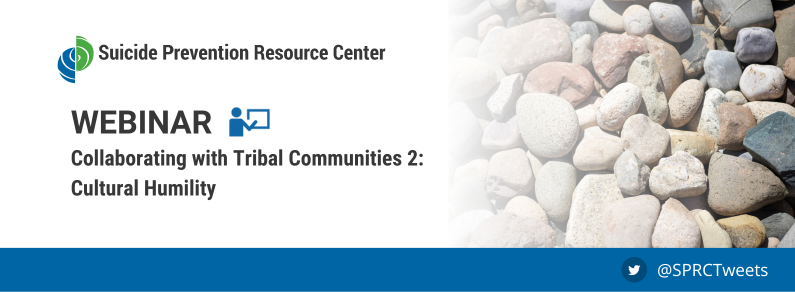In this webinar, presenters will define cultural humility and explore how to use one’s own cultural identity to strengthen connections with tribal people.
Collaborating with Tribal Communities: Cultural Humility


In this webinar, presenters will define cultural humility and explore how to use one’s own cultural identity to strengthen connections with tribal people.
The presentation highlights the different variables used to conceptualize strategies for suicide/violence prevention for the Hmong community in Minnesota.
This session will review the data and describe the special characteristics pertaining to the Hmong community. Differences between refugee and immigrant biopsychosocial factors and needs will be presented. Concepts discussed could be generalized to other refugee populations. Participants will share their knowledge and expertise in the area and will have an opportunity to engage in a discussion with the speaker and their peers.
True Thao
MSW, LICSW, is an experienced consultant and trainer who works with organizations in the areas of mental health, refugee issues, and Hmong culture. He helped businesses with cultural diversity, work site conflict mediation, and developmental insight for both Hmong professionals and Hmong consumers. True has a Masters from Rhode Island College in social work and served as program director foe several social service agencies. He is currently the Public Health Consultant to Hmong American Partnership in St. Paul, MN.
Four Webinars discuss developing effective approaches to promoting mental health and intervening with at-risk students at colleges or universities.
An overview of the rapidly developing evidence-base for best clinical practices in suicide prevention. This webinar is suitable for a wide range of individuals working in suicide prevention spanning from those planning and implementing comprehensive suicide prevention programs across states, tribes, and communities to those managing delivery points of health and behavioral health care.
David Litts, O.D. serves as Director, Science and Policy at the Suicide Prevention Resource Center (SPRC) and holds the position of Distinguished Scholar at Education Development Center, Inc. In this capacity, he leads a team of scientists and experts that guides the infusion of the best available science into all operational aspects of the SPRC. Additional foci are the development and dissemination of evidence-based suicide prevention policies and practices and the launch of the public-private partnership to catalyze the advancement of the National Strategy for Suicide Prevention. Prior to this position, he served for three years as Special Advisor to the Assistant Secretary for Health and the US Surgeon General, managing the completion and initial dissemination of the National Strategy for Suicide Prevention. He has also served as Chief of Staff for the Air Force Surgeon General and first Executive Director of the Air Force Suicide Prevention Program, where he oversaw the development of a comprehensive population-based suicide prevention program covering 600,000 Air Force personnel. The program was associated with a statistically significant, 55 percent drop in the suicide rate over four years. He is the recipient of the Surgeon General’s Exemplary Service Award and the Secretary’s Distinguished Service Award.
This webinar offers strategies for individuals to become active in promoting suicide prevention at the local, state and national levels. Key resources and information are highlighted for becoming informed and advocating with relevant legislators and media outlets.
Older adults die by suicide at a higher rate than the national average. Every year, more than 5,000 Americans over the age of 65 die by suicide, a death toll that is largely preventable. Elderly white men have the highest rate of suicide of all demographic groups in the U.S. Although suicide rates of older Americans have been slowly declining for many years, older men and women of every race continue to die by suicide, and the need for prevention is urgent. This webinar reviews the research associated with suicide among older adults, including risk and protective factors and effective suicide prevention strategies. In addition, this webinar will specifically address the issue of suicide risk and prevention in the context of community programs and residential facilities.
Objectives:
Participants will be able to:
Yeates Conwell, M.D. is Professor of Psychiatry, Vice Chair in the Department of Psychiatry, and Co-Director of the Center for the Study and Prevention of Suicide at the University of Rochester School of Medicine and Dentistry. He received his medical training at the University of Cincinnati, and completed his Psychiatry Residency and a Fellowship in Geriatric Psychiatry at Yale University School of Medicine. In addition to teaching and clinical care, Dr. Conwell directs a multi-disciplinary program of research in suicidal prevention, with a special emphasis on later life. He is a consultant to suicide prevention efforts in the United States, Europe, and China, and serves as a member of the Steering Committee of the Suicide Prevention Resource Center.
Ms. Miara is a Senior Project Director at the Education Development Center, Inc., with many years experience planning, implementing, and evaluating government-funded programs to prevent injuries, violence, and suicide. She is director of training and administration at the Suicide Prevention Resource Center. In collaboration with the National Association of Mental Health Program Directors and with funding from SAMHSA, Ms Miara also played a key role in the development of “Mental Health Promotion and Suicide Prevention: A Toolkit for Senior Living Communities.” She directed EDC’s efforts to use the results of an environmental scan and formative research to create a guide and training manual for the toolkit.
Rosalyn (Roz) Blogier graduated with a Master of Science Degree in Social Work from Simmons College, Boston MA where her studies were funded by a two-year NIMH grant in Community Mental Health Services to the Cambridge/Somerville, MA Mental Health Catchment area. Upon graduation, she briefly worked in child protective services and then was employed as an out-patient mental health therapist for a number of years in a variety of settings and locations. She worked in a community health center on the mental health unit, served in the department of psychiatry for a large urban health maintenance organization and maintained a private practice. Additionally, she served as the family program director on an inpatient drug and alcoholism treatment unit. She has engaged in treatment with individuals, couples and groups as well as creating psycho-educational programs in the areas of stress management, addiction, eating disorders and women’s issues. Roz moved with her family to The Netherlands for seven-and-a-half years, where she had a private practice that included running groups for parents with challenging children and completing home studies for expatriates adopting children domestically and internationally. She continued working in the field of adoption upon her return to the Washington, DC area before becoming a Public Health Advisor with the Substance Abuse and Mental Health Services Administration (SAMHSA) in 2008.
TIP 50 “Addressing Suicidal Thoughts and Behaviors in Substance Abuse Treatment” was recently created by the Center for Substance Abuse Treatment at SAMHSA to provide a practical manual for substance abuse counselors and their supervisors to assess and treat high-risk clients. The presentation will be interactive, with opportunities to ask questions. The presentation will be interactive, with opportunities to ask questions.
Kenneth R. Conner, Psy.D., MPH, is Associate Professor of Psychiatry, and Co-Director of the Center for the Study and Prevention of Suicide at the University of Rochester School of Medicine and Dentistry. He has training in psychology and public health and specialized training in suicide research through a NIMH-sponsored postdoctoral fellowship and a NIAAA-sponsored career development award. His suicide research primarily focuses on alcohol and drug use disorders. He was the Chair of the Substance Abuse and Mental Health Services Administration Center for Substance Abuse Treatment panel that developed a Treatment Improvement Protocol (TIP) for suicide prevention entitled “Addressing Suicidal Thoughts and Behaviors in Substance Abuse Treatment”, and led the effort to create a VA-sponsored training tape based on the TIP.

Shelly Rutz talks about pretesting the messages in the University of Wisconsin-Oshkosh’s “Life Happens, Let’s Talk About It” poster campaign. Shelly is the project director for the Comprehensive Suicide Prevention and Mental Health Project at the Universi
Shelly Rutz talks about pretesting the messages in the University of Wisconsin-Oshkosh’s “Life Happens, Let’s Talk About It” poster campaign. Shelly is the project director for the Comprehensive Suicide Prevention and Mental Health Project at the Universi

Shelly Rutz has found the use of “logic models” to be very helpful in her work at the University of Wisconsin-Oshkosh, where she is the Project Director for the Comprehensive Suicide Prevention and Mental Health Project. UW-Oshkosh is located in Oshkosh,